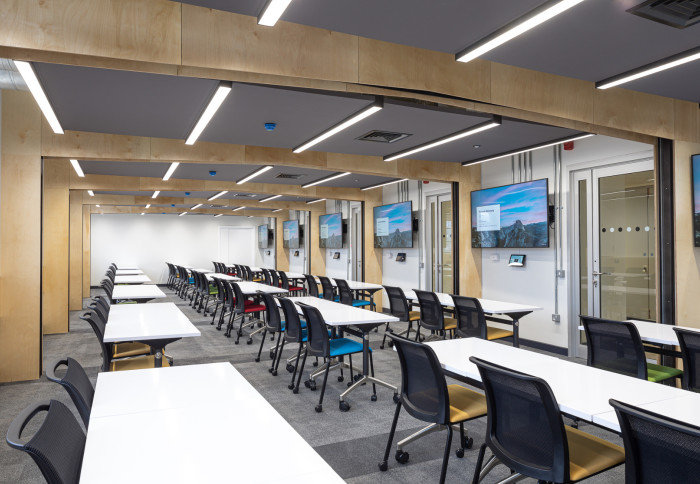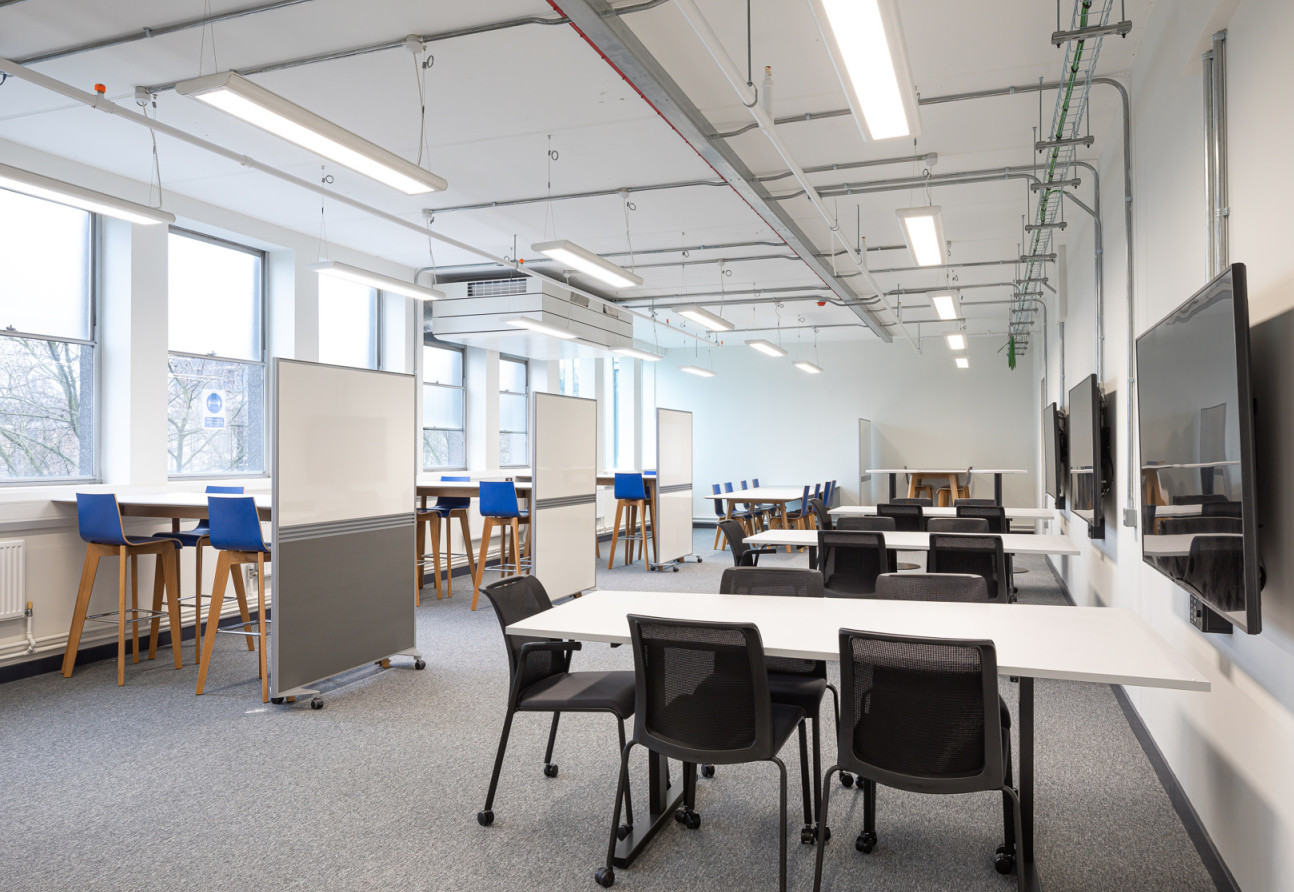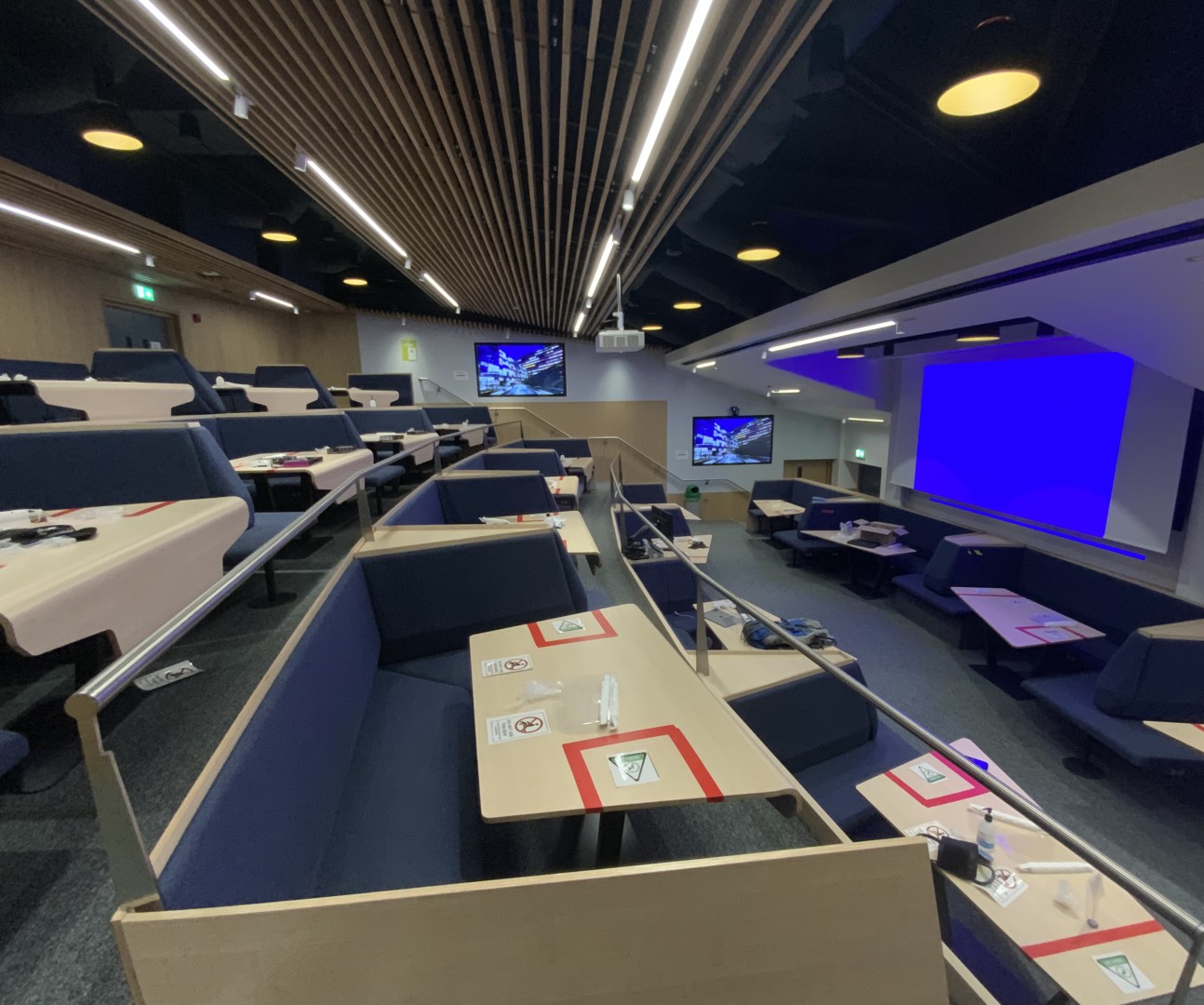Transformation of education spaces promotes independent and active learning
by Sarah Saxton

An investment of £4.2m has delivered new flexible and modern education spaces for active learning which support Imperial’s world class teaching.
Two newly refurbished teaching spaces that facilitate active learning are now in use in chemistry building C1/C2 on the main campus and the Glenister Building in Charing Cross. The upgrades have been carried out as part of the College 2018 vision for world class learning spaces that enable active learning and support the delivery of Imperial’s world class teaching.
The refurbishments have brought deteriorated and under used spaces back into service and have been designed to provide maximum flexibility to support a wide range of different teaching methods.
 Craig Walker, Strategic Lead for Education Infrastructure explained: “These new spaces incorporate the features that our students and teachers have told us are most important: comfort, power for student devices, adaptability to a wide range of teaching and learning styles, and writable surfaces wherever possible. They are also as flexible as can be within their respective building contexts. For example, Glenister enables seamless switching from didactic teaching to small group active learning due to the collaborative booth design. Similarly, Chemistry L6 has adaptable teaching rooms with 18 removable partition walls that allow adjustment of room stock on a termly basis to better match the demands of teaching timetables.”
Craig Walker, Strategic Lead for Education Infrastructure explained: “These new spaces incorporate the features that our students and teachers have told us are most important: comfort, power for student devices, adaptability to a wide range of teaching and learning styles, and writable surfaces wherever possible. They are also as flexible as can be within their respective building contexts. For example, Glenister enables seamless switching from didactic teaching to small group active learning due to the collaborative booth design. Similarly, Chemistry L6 has adaptable teaching rooms with 18 removable partition walls that allow adjustment of room stock on a termly basis to better match the demands of teaching timetables.”
Chemistry Level 5 and 6 previously hosted research laboratories that are now at White City. They have been repurposed and converted into flexible flat floor education space that can seat up 580 students in a variety of different configurations. The refurbished space boosts the amount of space available for independent learning and can also be used for examinations, project breakouts and small group teaching. Each of the removable walls and the desk surfaces has a whiteboard surface, which facilitates collaborative problem solving and learning.
Flexible teaching spaces
 The Glenister Lecture Theatre in Charing Cross has been converted from a traditional lecture theatre into a modern teaching space that enables collaborative student-centred teaching, while retaining capacity for traditional front-facing approaches. Up to 120 students can be seated for teaching in groups of six, and up to 137 can be seated for lecture style teaching.
The Glenister Lecture Theatre in Charing Cross has been converted from a traditional lecture theatre into a modern teaching space that enables collaborative student-centred teaching, while retaining capacity for traditional front-facing approaches. Up to 120 students can be seated for teaching in groups of six, and up to 137 can be seated for lecture style teaching.
Dr James Moss, Head of Education Space for the School of Medicine and Senior Teaching Fellow in the National Heart and Lung Institute, ensured students and staff were involved at all stages of the re-design of the Glenister Lecture Theatre. Dr Moss said: “Our priority was to modernise a teaching space that no longer met our needs at the same time as helping to deliver on the Learning and Teaching Strategy objectives. The student experience was central to all aspects of the design. We maximised the accessibility of the room, used technological solutions to address architectural constraints and provided power to all seating positions. Creating quality learning spaces in tiered environments is challenging, and the staff and student partners that helped shape this new space are thoroughly pleased with the outcome – now it is a room that teachers want to teach in and that students want to learn in.”
Student perspective
“The newly refurbished Glenister lecture hall was amazing - the tables, the USB charging ports, sockets, the screens, the layout. And as a place for learning, it felt much better than all of the other lecture halls.” 2nd year MBBS student
Whilst neither Chemistry levels 5&6 or the Glenister Lecture Theatre have been in full operation due to the pandemic, they are being used (in a socially distanced way) by undergraduate Chemistry and Medicine students currently being taught on campus.
Students can expect to interact more with their educator in the Glenister Lecture Theatre as the redesign has removed the lectern. This encourages staff to move around the space more and engage with different groups of students.
Ongoing work
The transformation of Chemistry Level 5 and 6 and the Glenister Lecture Theatre is part of an ongoing programme of work to develop and modernise the College’s teaching spaces. Through strategic investment we will continue to upgrade our learning and teaching spaces to meet the evolving needs of our students, teaching methods and curricula.
Professor Neil Alford, Associate Provost (Academic Planning) set out the programme’s next steps: “Looking forward there are plans to refurbish the first year undergraduate Physics labs in Blackett, to explore further refurbishment for teaching spaces in Chemistry 1&2 levels 7 and 8, in Huxley, Electrical Engineering and in RCS1. Much of the space will be for teaching but there are also plans to expand common spaces through student-led projects and we hope to begin these in 2021 – 2022. The Estates team continue to do a remarkable job in converting very poor spaces into space that is attractive, functional and fit for purpose.”
Article text (excluding photos or graphics) © Imperial College London.
Photos and graphics subject to third party copyright used with permission or © Imperial College London.
Reporter
Sarah Saxton
Communications Division